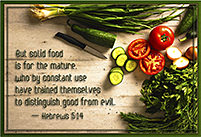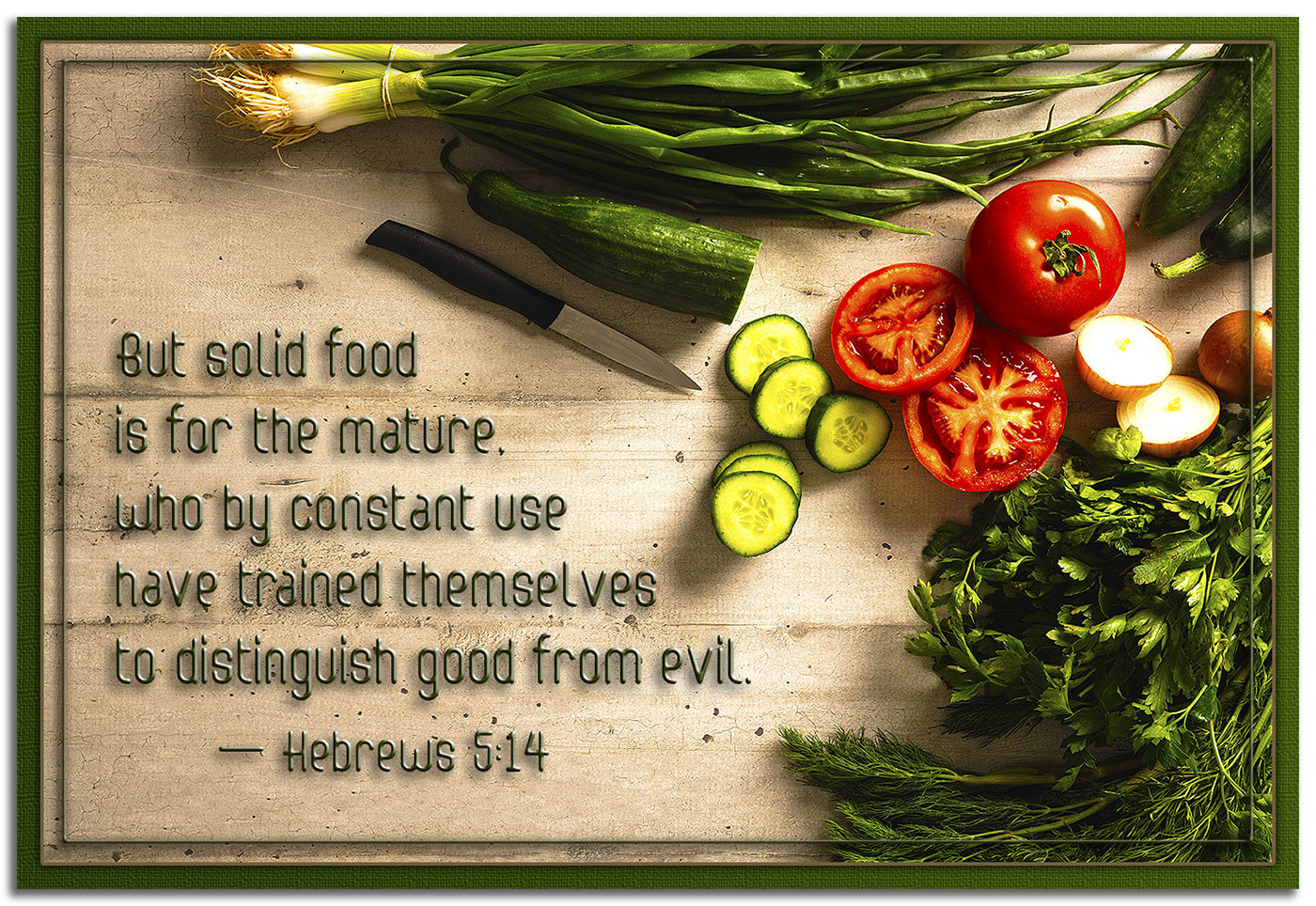Hebrews 5:11–14 . . .
“Warning: Don’t Fall Away”
We'll see in today's commentary how the author will pause from his lesson on Melchizedek because he realized that his audience would have trouble understanding what he was about to say. He'll rebuke them for being extremely slow to learn; he'll support his indictment of them by declaring convincingly that they should have been teachers by now (v. 11). In reality, they themselves needed to be taught, all over again, about righteousness and the truth of God's Word.
Starting in v. 11, the author takes a few moments to warn his readers not to fall away from their teachings. He won't return to the subject of Jesus being the High Priest until the end of chapter 6. Here he's paused from his prime subject because he was worried that the readers of his letter weren't prepared to understand the meaning of what he'd written. They were Christians who hadn't yet developed their Christianity appropriately. They worked hard to help other Christians, demonstrating true love by supporting them (6:10). But they seemed to have neglected their faith in God; their hope in him wasn't as strong as it should have been (6:11).
The author’s solution to these problems was to remind the Christians about what they'd learned about Jesus, especially about how God had saved them by Jesus’ death on the cross. Their faith had to be strong in regard to God’s Word, not their own feelings and desires. The author also urged them to trust God more so they could effectively teach others who Jesus was in their lives. Only if they did these things would they be strong enough to deal with future troubles by discerning good from evil.
The previous passage, starting with 5:1, turns now to these four verses, designed to examine the spiritual condition of the readers of this epistle. Herein, vv. 11–13 describe their immature state; v. 14 presents to them what they should become. It's been quite evident thus far in "Hebrews" that the author's heart has been deeply troubled over the spiritual state of some of his readers. Twice, so far, he's warned them at some length of their being in danger of resorting to the unbelief of the Israelites in the wilderness. By failing to believe in God the way that the wilderness Israelites had, the Jewish Christians to whom this letter had been addressed would also fail to enter into the spiritual rest that they'd been promised. Once again the author will now confront and caution his audience about their perilous state.
Caution: Do Not Fail to Try to Understand! (5:11)
We learned in last week's summary (5:1–10) that Jesus is the High Priest according to the order of Melchizedek. Jesus was called by God, not as a result of his personal aim or ambition. Today’s passage starts with a repeated rebuke, criticizing his readers for being complacent or lazy. The Greek nōthros in v. 11b identifies people who lack a work ethic.
Warning Against Falling Away
11We have much to say about this, but it is hard to make it clear to you because you no longer try to understand (5:11).
The "much to say about this" will be expounded in chpt. 7. From here until the end of chpt. 6, the author will deal with problems he believed prevented his readers from acknowledging the truth about the person of Jesus. More critically, the author's exhortation wasn't intended to bulldoze his readers with uncompromising threats or impossible demands. Rather, he sought to awaken those who were lazy from their theoretical slumber to a life of intellectual awareness and readiness, relying upon learning about the reality of Father God’s Son, so that they'd be prepared for their upcoming wilderness journey.
Following the opening attention-getter clause in v. 11a, we read of the author's criticism of his readers' refusal or complacency to educate themselves and "try to understand" what they've seen and heard about Jesus. Bible versions that use the alternate phrase "since you have become dull of hearing" bring to mind why the author stopped writing more about the topic of Melchizedek. He wanted to address critical fundamentals before focusing on more-intricate topics, such as those dealing with the priesthood of Melchizedek; sadly, the spiritual state of his readers made it difficult to clarify what needed to be said to them.
Matthew Henry says this of those who "no longer try to understand": "Dull hearers make the preaching of the gospel difficult, and even many who have some faith are but dull hearers, dull of understanding and slow to believe; the understanding is weak, and does not apprehend these spiritual things; the memory is weak, and does not retain them. . . The author insists upon the faultiness of this infirmity of theirs. It was not a mere natural infirmity, but it was a sinful infirmity, and more in them than others, by reason of the singular advantages they had enjoyed for improving in the knowledge of Christ (v. 12)."
Pastor and commentator David Guzik writes this about v. 11b: "[The author] feared the discussion of Aaron and Melchizedek and Jesus sounded too academic and theoretical to his readers. At the same time, he recognized that this said more about his dull hearers than it did about the message. It wasn’t that the message was too complicated; it was that the hearers were dull of hearing. . . Being 'dull of hearing' is not a problem with the ears, but a problem with the heart. The hearer isn’t really interested in what God has to say. Not wanting to hear the Word of God points to a genuine spiritual problem."
In fact, the central concern of "Hebrews" is to provide an orderly, theological instruction for its readers that targets a learned outcome: in this case, a perfect or complete understanding of Christ, as highlighted in 6:1.
To Be Taught, then to Teach (v. 12)
After explaining to his Hebrew Christian readers the concept of the priesthood of Melchizedek that he introduced in vv. 1–10, he paused here to comment on how this doctrine is a little deep for his readers, since they're "dull of hearing" (v. 11). While they should have become capable teachers by now, they instead were still in need of being taught the basics. By now they ought to have been mature in their knowledge of the Lord; sadly, they were like babies when it came to doctrinal issues; they required living on a "milk" doctrine (the elementary truths of Scripture) before they'd be able to understand a "solid food" doctrine, such as Melchizedek's priesthood.
12In fact, though by this time you ought to be teachers, you need someone to teach you the elementary truths of God’s word all over again. You need milk, not solid food! (5:12)
Regarding the author's admonition that his audience "ought to be teachers," it wasn’t that they were unique people who'd been taught, trained, and qualified to serve uniquely as teachers. Instead, they "ought to be teachers" in the sense that every Christian should be a teacher. That way, we disciples of Lord Jesus can disciple others. What's more, we disciples are able to master a task or a study after we've effectively taught it to someone else.
Appropriately, readers of v. 12 are urged to practice personal examinations and realizations of their need for "solid food" to clarify the revelation of God’s "teaching about righteousness" in Christ (vv. 12–14). Parents easily understand the author’s use of the "milk, not solid food" metaphor. Infants are fed milk until their digestive systems develop the capacity to break down and absorb solid food's essential nutrients that enable them to mature and grow to adulthood. Lazy learners are unprepared to receive and understand the nutrients of God’s Word (v. 11), without which their spiritual growth is impossible; spiritual failure will likely result (cf. 3:18–19; 4:11–13).
Summarizing the contrast between milk and solid food: Milk" corresponds to the primary principles of the elementary truths of God's Word. "Solid food" is a meatier material (e.g., understanding how Jesus and Melchizedek are connected). It isn’t that "milk" is bad; it's that these Hebrew Christians should have included "solid food" in their diet of understanding God's Word.
The author’s congregation (which includes most of us) had already learned their introduction to the basics about God’s message from the apostles (cf. 2:3–4). They’d completed the required course work, but they were still unable to press on and perfect themselves as a holy people (6:1), destined to inherit God’s promises (6:12).
Babes in Their Belief (v. 13)
Readers of this epistle trusted in Christ but still hadn't grasped the elementary teachings of God's Word. They were like babies who, because they were unable to eat meat, needed milk. The writer couldn't effectively teach them more because they weren't able to understand it. They hadn't advanced and matured as expected; they were still "babes" in their belief, able to take in only the simplest of teachings.
13Anyone who lives on milk, being still an infant, is not acquainted with the teaching about righteousness (5:13).
The cause of their immaturity is clearly described herein. They were "not acquainted with the teaching about righteousness," which is fundamental to the Christian faith, as opposed to self-righteousness or works-righteousness. Through the centuries, ignorance of already having a righteous position in God's eyes, through faith in Christ, has been the cause of much useless effort aimed at earning righteousness. It invariably produces a form of legalism that attempts to earn "brownie points" with God, to gain his acceptance and approval.
It's an adult infant who feeds on milk without acquainting himself with the words about righteousness. An adult's use of only milk proves him to be an infant; of course it's characteristic of babes [of all ages] to lack knowledge, acquaintances, and experience. The "teaching about righteousness" is an expression not for higher teaching, such as the doctrine of the Melchizedek priesthood, but for religious truth, or particularly, Christian truth in general. In this general region, the Hebrews, being babes and having followed only elementary doctrines, were unfamiliar and unacquainted with such righteousness teachings; their unexercised organs prevented them from receiving requisite understanding that would enable them to discern good and evil so they could live accordingly.
For Whom Is Solid Food Suitable? (v. 14)
Clearly shown in v. 13, the condition into which the Hebrews had fallen made them unfit to receive the solid food the author wanted to offer them. By contrast, v. 14 shows the kind of people for whom his solid food was suitable: Solid food (such as the author offered) is for full-grown, mature adults.
14But solid food is for the mature, who by constant use have trained themselves to distinguish good from evil (5:14).
The "solid food is for the mature" represents solid teaching that's directed at and meant for those who are fully grown in the knowledge and practice of the Word of God. The spiritually mature aren't babes, familiar only with milk; they are those whose organs of sense get exercised by using them, those who can conclusively discern good and evil, that is, what's righteous and wholesome versus what's injurious and harmful.
A mature Christian can eat solid food. This means that he and she can understand and apply things that come from the Spirit of Jesus. They study God's Word and they pray; they learn and train themselves how to discern and appreciate, in every situation, what's good, what's bad, and what God has asked them to do. With such training, they grow strong in their belief, using their mind and indwelt Spirit to do what's right and avoid what's evil. In this way they learn to grow and mature as righteous Christians.
Since understanding and practicing the truth of the high priestly ministry of Jesus leads believers to such maturity, it's obvious that it's one of the most important truths of Scripture. It's also one truth that every Christian should seek diligently to grasp and practice.
Closing Considerations (from Dr. Charles Stanley)
Many modern-day inventions are designed to help us accomplish tasks more quickly. But not every process lends itself to acceleration. Consider our growth in Christ, which is known as sanctification. Being a Christian is neither an event nor a quick fix. Rather, it's a journey. Sadly, some people grow little after their salvation. They're not encouraged in their faith or discipled well. Others fail to pursue maturity through prayer, meditation on Scripture, and fellowship. God isn't pleased when his children opt for complacency.
Have you noticed a change in your life and character since the day you became saved? Can you detect your spiritual growth over the last year? Your heavenly Father wants to mature you. So make a continuous effort to cooperate with Him by reading Scripture, praying, fellowshipping, and repenting of all known sin in your life.
Realize that when we become Christians, we aren't instantly wise and knowledgeable — learning begins at salvation and continues the rest of our life. Some believers don't seem to grow up at all. They get older, but their understanding of God's Word never goes very deep. This lack of spiritual wisdom results from their ignorance of the Scriptures and their apathy, complacency about matters of faith, and a failure to apply biblical truths. Remember, just reading God's Word isn't enough. Without applying what you've read, all you have is head knowledge. Obedience trains us to discern good and evil. Through practice, we learn wisdom and develop spiritual maturity. With God's grace and your perseverance, the ability to discern will come.
Our lives are filled with situations that require discernment. Sometimes we can be so busy trying to determine God's will and direction for our next step that we fail to hear his voice. He's calling us to come and spend quiet, unhurried time with Him, absorbing the truth of His Word and listening to Him. Once we learn to listen to our Lord, we can begin applying what we've learned. Only as we put his Word into practice in our lives will we have our senses trained to discern good and evil (v. 14). The Scriptures open our eyes to see all of our experiences from God's perspective so that we're able to make wise choices.
Our challenge for today and every day is this: Make it a priority to spend time with the Lord in His Word. We may have to reorganize our schedule or wake up earlier. But it's well worth the effort — discernment and wisdom await us if and when we put into practice the truths we absorb daily.
- Q. 1 Are you dull of hearing (v. 11)? . . . Are you a teacher (v. 12a)? . . . Do you take milk instead of solid food (v. 12b)?
- Q. 2 Are you still an infant (v. 13)? . . . Or are you mature and able to discern good from evil (v. 14)?
Hebrews 5:11–14
New International Version (NIV) or view it in a different version by clicking here.
— Listen to chapter 5, narrated by Max McLean.



